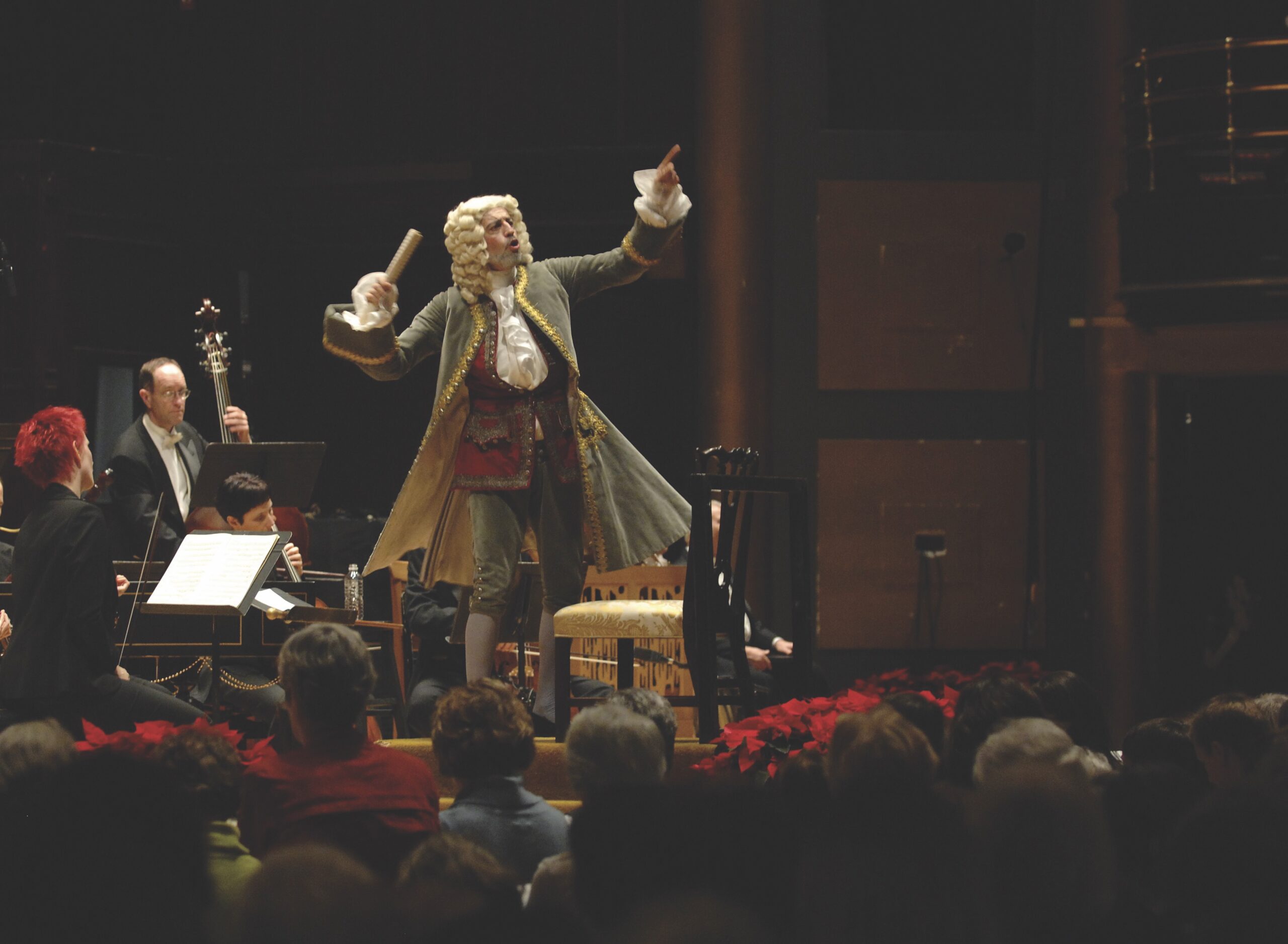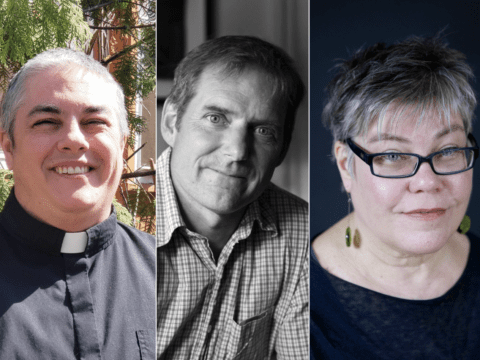We assemble in the drafty hall assigned to the choir. The men are in tuxedos, the women in black-and-white ensembles, with pearls. Concert dress. Somewhere, in another hall, the orchestra is gathering. In smaller quarters, the soloists are carrying out arcane warm-up rituals associated with their craft.
Among the choir, some altos take a final look at the more complicated sections. Tenors fix one another’s bow ties. A few sopranos sip from water bottles. Someone notices a bass is accidentally wearing green socks.
You may unsubscribe from any of our newsletters at any time.
To any onlooker, it would seem that no one — no one! — among the 50 of us in the London Pro Musica choir in London, Ont., is thinking about the powerful first line we will sing in just a few minutes: “And the glory, the glory of the Lord shall be revealed!”
This is the season of the Messiah. In hundreds of churches, cathedrals and concert halls across Canada and around the globe, the best-known work of George Frideric Handel will be performed. Musicians ranging from community and church choirs to the finest performers in the world will sing about the “King of kings and Lord of lords” who will “reign for ever and ever.”
But do they mean it? Are performances of Handel’s Messiah and other classical works inspired by the seasons of the church really about a “King of kings,” or are they simply concerts featuring some of the best music ever written? Is this worship, or is it entertainment?
The answer is probably both. But perhaps surprisingly, for many musicians who perform the Messiah and other well-known classical works based on Christian themes, a degree of spirituality underpins the performance.
Vicki St. Pierre has a unique perspective on the question: she is the director of music and the choral conductor at St. James’ Cathedral in Toronto and a member of the music faculty at Wilfrid Laurier University in Waterloo, Ont. But she is also a talented mezzo-soprano who performs internationally, and has appeared as a soloist in the Messiah dozens of times.
“For me, it’s both [worship and entertainment],” she says. “I call myself a Christian, and I do believe the words — for the most part — as I am singing or conducting.”
She says that many factors have an impact on whether a seasonal classic is received as worship or entertainment: the venue, the mindset an audience member brings to the event and the quality of performance. “The better the performance, the more possibility there is that audience members will experience it on a spiritual level.”
Rufus Müller is a well-known American tenor who also performs in Canada, the United Kingdom and continental Europe. He believes that distinguishing between performance and worship is an artificial division. “Having had a very charismatic preacher for a father, my experience — as a child and young teenager — of the act of worship was always inextricable from the sense of a performance,” he says. “The Christian pieces I most often sing in public are Messiah and [Johann Sebastian] Bach’s passions [the St. John Passion and the St. Matthew Passion]. In both, I consider it part of the ‘role’ to deliver a message — regardless of my own faith or that of the audience.”
Müller says that early in his career, he preferred not to sing these Christian pieces “in what I considered the artificial or even distractingly secular environment of a concert hall, rather than in a place of worship. But it quickly became clear to me that the venue is far less important than delivering the message about the inextricability of humanity and the Divine.”
He suggests that the question of worship versus entertainment should be left at the door to the concert hall. “I like the blurring of the lines between ‘performance’ and ‘religious experience.’ In the end, the less I am aware of the difference, as a performer, the more likely it is that the audience won’t find it necessary to define the experience as one or the other.”
Mark Vuorinen is the conductor and artistic director of Kitchener-Waterloo’s Grand Philharmonic Choir, which has a tradition of performing Bach’s trilogy of choral works (the two passions and the Mass in B Minor), as well as Handel’s Messiah. He believes that the power of the work can rise above the venue.
“Bach intended these works as liturgical expressions, but experiencing them in the concert hall can still be transcendent regardless of one’s personal spiritual convictions,” he reflects. “The human experience, struggling to understand the spiritual world, is acutely palpable in Bach’s music. This is true whether it is heard in a concert hall or in a liturgical setting.”
An intriguing perspective comes from one of Vuorinen’s choir members, Luisa D’Amato, who is also past-president and volunteer executive director of the Grand Philharmonic Choir. She has sung these liturgical masterpieces for three decades, but as “an atheist of Jewish background,” she describes her reactions as “very complex.”
Says D’Amato, “Although I don’t always believe the literal truth of the words I’m singing, and I also find some of the text — parts of the St. John and Matthew passions particularly — very painful in its blaming of the Jews with the terrible historical consequences that followed, I do engage profoundly in, and sympathize with, the search for meaning in the world that the choral repertoire represents.”
She continues, “I love this music very much. Singing it brings me as close as I have ever come to a spiritual or religious experience. I think this isn’t an act of worship so much as a sense of connection with the souls around me. . . . Our audiences really experience our work as a profound event of the human spirit, whether that is religious for some, intellectual or emotional for others.”
Organist David Briggs, a native of Britain who is currently based at St. James’ Cathedral in Toronto, can often be found at a pipe organ console in the finest concert halls and cathedrals of the world. He says spirituality is always part of his performance — even when the music is not explicitly religious.
“I believe very strongly that great music can inspire people like nothing else and give them some clear glimpses of God. [It] can also bring people into a greater awareness of their own spirituality, if they are open to it. I remember meeting a priest once who said that he realized his vocation as a result of attending an Evensong in Gloucester Cathedral,” says Briggs, referring to the English cathedral where he once served as music director.
“So we can touch people very deeply,” he adds. “Music can really heal people and also bring people closer together, be it individuals or indeed entire nations. It has to do with a sense of deep beauty, which we humans need to function well together. As a practising church musician, I try never to lose sight of this fact.”
It’s almost three hours later. The audience has offered a lengthy standing ovation. The conductor and the soloists have taken their bows, as has the orchestra and all of us in the choir. Singers are slowly dispersing, most with warm, if tired, smiles.
Their experiences have probably covered the spectrum, from pleasure in a good performance to a mystical sense of being in the presence of the Lord of lords.
And for me — back in the first bass section, standing next to my buddy with the green socks — was there glory? Oh yeah. There was glory.
***
This story first appeared in The United Church Observer’s December 2014 issue with the title “Encountering the Messiah.”













